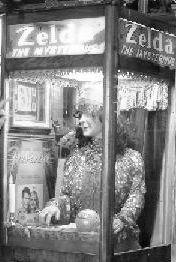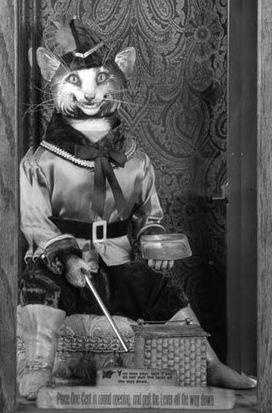当前你的浏览器版本过低,网站已在兼容模式下运行,兼容模式仅提供最小功能支持,网站样式可能显示不正常。
请尽快升级浏览器以体验网站在线编辑、在线运行等功能。
3153:Pencils from the 19th Century
题目描述
Before "automaton" was a theoretic computer science concept, it meant "mechanical figure or contrivance constructed to act as if by its own motive power; robot." Examples include fortunetellers, as shown above, but could also describe a pencil seller, moving pencils from several baskets to a delivery trough.

On National Public Radio, the Sunday Weekend Edition program has a "Sunday Puzzle" segment. The show that aired on Sunday, 29 June 2008, had the following puzzle for listeners to respond to (by Thursday, 3 July, at noon through the NPR web site):

For our purposes, we will expand on the problem, rather than just getting 20 pencils for 20 cents (which is shown in the sample output below). The input file will present a number of cases. For each case, give all solutions or print the text "No solution found". Solutions are to be ordered by increasing numbers of four-cent pencils.

On National Public Radio, the Sunday Weekend Edition program has a "Sunday Puzzle" segment. The show that aired on Sunday, 29 June 2008, had the following puzzle for listeners to respond to (by Thursday, 3 July, at noon through the NPR web site):
- From a 19th century trade card advertising Bassetts Horehound Troches, a remedy for coughs and colds: A man buys 20 pencils for 20 cents and gets three kinds of pencils in return. Some of the pencils cost four cents each, some are two for a penny and the rest are four for a penny. How many pencils of each type does the man get?

For our purposes, we will expand on the problem, rather than just getting 20 pencils for 20 cents (which is shown in the sample output below). The input file will present a number of cases. For each case, give all solutions or print the text "No solution found". Solutions are to be ordered by increasing numbers of four-cent pencils.
输入解释
Each line gives a value for N (2 <= N <= 256), and your program is to end when N = 0 (at most 32 problems).
输出解释
The first line gives the instance, starting from 1, followed by a line giving the statement of the problem. Solutions are shown in the three-line format below followed by a blank line, or the single line "No solution found", followed by a blank line. Note that by the nature of the problem, once the number of four-cent pencils is determined, the numbers of half-cent and quarter-cent pencils are also determined.
Case n:
nn pencils for nn cents
nn at four cents each
nn at two for a penny
nn at four for a penny
输入样例
10 20 40 0
输出样例
Case 1: 10 pencils for 10 cents No solution found. Case 2: 20 pencils for 20 cents 3 at four cents each 15 at two for a penny 2 at four for a penny Case 3: 40 pencils for 40 cents 6 at four cents each 30 at two for a penny 4 at four for a penny 7 at four cents each 15 at two for a penny 18 at four for a penny
来自杭电HDUOJ的附加信息
| Recommend | chenrui |
最后修改于 2020-10-25T23:00:40+00:00 由爬虫自动更新
共提交 0 次
通过率 --%
| 时间上限 | 内存上限 |
| 2000/1000MS(Java/Others) | 32768/32768K(Java/Others) |
登陆或注册以提交代码